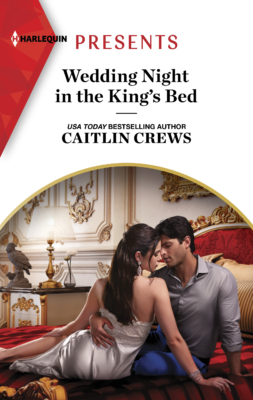Wedding Night in the King’s Bed
HEAT
LEVEL:
Satisfyingly Spicy
His Majesty requires an untouched bride…
But can duty ever become love?
Virginal Helene Archibald knows she’s destined for an arranged marriage. So, when her father declares she’ll be given to a king in a loveless union, she accepts it as fate.
But Helene is unprepared for King Gianluca San Felice, and the wild fire that awakens at the sight of him! She is undone by the craving that consumes them on their wedding night. But outside the royal bedchamber, Gianluca remains ice-cold—dare Helene believe their chemistry is enough to bring this powerful ruler to his knees?
Start reading
Wedding Night in the King’s Bed
Jump to Buy Links →
Chapter One
“You don’t have to marry him,” Helene Archibald’s cousin, best friend, and maid of honor said urgently—and unsolicited—as they stood together in the antechamber of the cathedral.
Outside the small yet ornate little room there were the sounds of organs and a great many people and a grand regal destiny besides, but here there was only the two of them. And Helene’s astonishingly prodigious bridal train, pouring all over the old stone floor in a slithering cascade of elegant ivory fabric. Not to mention what had to be every flower in the whole of the Kingdom of Fiammetta, which had been nestled high in the Alps between Italy and France since the Dark Ages, as if to scoff at the frigid January weather with every bright and fragile blossom.
Her cousin, perhaps emboldened by the way her voice echoed between them and the flowers and the dour religious iconography on the stout old walls, carried on with a certain resolute passion. “Who cares if he’s a whole king? I’ll spirit you away myself.”
Helene found this sweet, and unnecessary, but found herself questioning the logistics of the claim all the same. “Would we run off by foot? Down all the closed-off streets monitored by the palace guards and, last I checked, crowded with well-wishers?” She considered, and thinking about an exit strategy she didn’t actually want was a nice change from standing about, heart rate alarmingly high, waiting to rush out into the main part of the church so she could then…walk. Very, very slowly up an acre or two of aisle to marry a man who was indeed a whole king in front of a crowd both in person and via all the cameras. “And if we somehow made it through, what would we do then? Dressed like this, no less. Would we clamber up the side of the nearest mountain and hope we could slide on our backsides all the way into France?” She gave the endless train a bit of a fluff so that it slithered out even farther across the stones. “In fairness, this might make an excellent slide. Assuming we chose the right mountain, that is. I hear some of these peaks on the Italian side are quite treacherous.”
Faith, lovely and loyal Faith, puffed herself up as if prepared to take off in an immediate sprint for the white-capped hills when, until today, Helene could not recall her soft and sweet cousin committing to anything more physically taxing than a saunter down to a sunny beach to lounge about beneath an umbrella. “Only say the word, Helene. I mean it.”
“I know you do,” Helene assured her. The organ music out in the main part of the cathedral began to climb and swell, soaking in through the walls. There was a sudden uptick in the sounds of muffled coughs and shuffling feet from the hundreds of elite and important guests. She imagined the King himself was already there, standing at the head of the aisle as if the flying buttresses had been arranged to highlight his glory, not God’s. They might have been, at that. She smiled, though inside her body, hidden away as it was in yards upon yards of white silk and ivory lace, something darker and deeper…hummed. “But I think I might as well go through with it, don’t you? Since everyone has gone to all this bother?”
“I hope that is one of your charmless jokes, Helene,” said her father, then, closing the door to the rest of the cathedral that she hadn’t heard him open. With his usual fastidious precision. Then he merely stood there, pinning her with that cold glare of his. “Of course you’re going through with it. This is your wedding to the King of Fiammetta, for the love of all that is holy. It does not require thought.”
What Helene wanted to say was, Not for you, Papa, I know.
But she had long since decided that there was no point arguing with her father. Herbert Marcel Archibald was slim like a wire, always vibrating with outrage and insult. There was nothing fruitful to be gained in debating him on any topic. The last time she had attempted it had been before her lovely, happy, bright beacon of a mother had died.
After Mama had gone, there was nothing to argue about. Helene did not expect her father to see her, much less know her, and he had not pretended to attempt either one. Instead, he had made his expectations for her excessively clear: she was to make a brilliant marriage, as, indeed, her own mother had done with him. Helene was to carry on this tradition of marrying up. She was to excel in all things so she might make herself nothing short of a shiny prize for him to barter away, the better to bolster his own wealth and consequence, as Archibalds had been doing for generations.
Helene had not exactly been thrilled with this fate, having harbored her share of dreams in which she imagined herself, variously, as an astronaut, a judge, and a mermaid. But she’d remembered the stories her graceful, warm mother had told her. Stories of princesses and castles. Fairy tales and happy endings that came from things like arranged marriages—much nicer to contemplate than the age-old games men like her father preferred to play.
She liked to remind herself that she could have rebelled, if she wished. Helene could have turned her back on her father and all his demands, but whenever the urge to do that rose up in her, she reminded herself that Mama never had. That she had stayed with Herbert and despite the obvious chill, had claimed she was happy.
I am safe and cared for, Helene had heard her mother tell Faith’s mother, her sister, long ago. Not all of us are made for passion. Some of us bloom more quietly.
Helene had decided, then and there, that if she could bloom as her mother had, that would be a life well spent indeed.
And it had certainly been a frosty half a decade since the cold fall day they’d laid her beloved Mama to rest, but Helene liked to remind herself that she’d chosen to stay with her father. To submit to his demands and expectations. To do the things she knew her own mother had done, in her time, and how bad could all that cold civility be, really? She’d grown up watching her parents freeze at each other, and her mother had called that a kind of blooming.
She’d started to consider herself an icy little rose.
Just say the word, Faith mouthed at her now.
Because her parents had married for love. Something they could do, Helene knew, because her own mother—as eldest daughter—had not.
“Come, Helene,” Herbert snapped at her, as if the ceremony was something he could do on his own. As if she was keeping him from his wedding.
“Yes, Papa,” she murmured, as she always did, shooting a smile Faith’s way.
And thought about her mother, who would have loved this day no matter how it came about. A cathedral. A kingdom.
An honest-to-God king.
Mama would have thought this was nothing short of a festival of blooming.
Helene took her father’s impatient arm, and let Faith tuck her away behind the overtly traditional veil no one had asked her if she wanted to wear. Herbert then led her, with all possible ostentation, to the great doors of the cathedral proper, where the King’s royal guard stood with expressions of great solemnity.
No one checked in with her. No one asked if she was ready.
Helene told herself that was likely because she exuded readiness, as was expected.
The guards waited for a signal from the palace aide dressed in finery that managed to look as capable as it did chic, who cocked her head toward what Helene knew by now was an earpiece. The aide spoke softly.
Inside the main part of the cathedral, the organ music swelled anew, into a piece of music that sounded so ornate it made Helene’s bones seem to ache inside her skin—or perhaps, she chided herself with a lot less of the drama she knew her father had always disliked in her mother, it was simply a draft from the cold winter’s day outside.
But when Helene thought of her mother’s most loved stories, the ones she had told time and again that were the most magical of all, she sighed a little. Quietly, there beneath her veil where no one could hear her. And decided to believe it was the music.
The aide pressed a manicured finger to her ear and nodded at the guards, then smiled by rote at Herbert. Over Helene’s swaddled form, making it clear that she was the person here with the least significance.
Or, perhaps, she had been identified as the one least likely to complain.
Faith murmured something that sounded like Ready when you are, which Helene decided to pretend was about the wedding and not escaping it. She waited a breath, then another, and then moved in front of Helene only when Herbert made a huffing sound, accepting the bouquet the palace aide handed her as she slipped in one of the smaller doors to start down the aisle.
The music carried on, a tumbling, soaring symphony that twined with the humming inside of Helene and made every part of her…electric.
Then the great doors were hauled open. The crowd within rose, turned to look at her, and she settled in for a nice long think about…well. Everything that had led her here.
To this cathedral halfway up a mountain in a tiny kingdom that alpine dreams were made of. Where she had lied by omission to her beloved cousin, because she’d allowed Faith to believe that she was being forced into this marriage. It was easier to pretend that she was. Because Helene wasn’t sure she had the vocabulary to explain what had happened to her to make her a far more willing participant than Faith was likely to imagine possible…
Besides, it was a very long walk down the cathedral’s main aisle. So long that Helene couldn’t really make out which figure down there at the end was the man who was the real star of this show today. There was a scrum of finery blocking the view and the bishop himself looked resplendent, and yet she somehow doubted that her august groom would blend.
Her groom. The King of Fiammetta himself. One Gianluca San Felice, known far and wide for his stern male beauty as much as his forbidding magnetism that should have scared Helene but, instead, had hummed deep within her from the start.
It hummed in her now, too, darker and deeper with every step.
He would shortly be her husband, and, one day, the father of her children. At least two, she expected, since Gianluca was in possession of a throne. And everyone knew full well that anyone who happened to find themselves on a throne—or even in the vicinity of one, really—generally preferred to have a distinct line of succession put in place behind them to lock the whole enterprise down for generations to come.
Helene preferred to think about blood and lines of succession as if they were somehow unconnected to people. And to her. Because otherwise there was only that heavy, odd feeling that settled in her as she thought about children. Or, rather, the act of making said children with Gianluca, more an immensity than a man.
That thing inside her that she thought was him, or his, hummed all the more.
Marrying advantageously, and always ambitiously, was the single task of an heiress, her father had told her. Over and over again. Back when she was small he had talked quite openly about the consolidation of hereditary assets—the usual estate or two—and the way in which that could, if done well, create an upgrade in his own, personal status as well as hers. Which ought to have been her primary goal, clearly. Her mother would catch Helene’s eye across the long, polished table where children were permitted to appear only if silent, her bright eyes brimming with laughter.
Later, she would curl up with Helene in the nursery and spin out the most fantastic stories about how Helene’s marriage would be a wondrous thing, no matter what her silly Papa imagined. That she and her dashing prince would have adventures and slay dragons, dance at marvelous balls, and live a happy and glorious and magical life.
But when it turned out that Helene was going to be first lovely, then objectively pretty, then really quite beautiful, Herbert had gotten greedy. Especially when Helene had turned out to be clever as well, locked away in her exclusive Swiss boarding school where a certain sort of rich man sent his daughter if he wanted to be absolutely certain that she could have no personal life he did not know all about. There was no sneaking out of the Institut. It was a truly lovely prison, set behind high walls and surrounded by guards, where there were never more than ten girls in each year and all of them were earmarked by others for the sort of lives that took place in hushed, elegant castles of one sort or another the world over.
There wasn’t much to do but study, take classes, and dream of Prince Charmings they were not allowed to meet without familial oversight.
Helene had always considered herself lucky that her father actually let her finish her education, which was not the case for many of her schoolmates. Plus the extra finishing year that the school was famous for—because, it was whispered, certain monarchs who married for love had made use of the Institut’s finishing when their scandalously lower-brow queens needed a quick gloss-up.
She’d graduated in full just before her twentieth birthday and had expected her father to put her directly on the auction block—figuratively, she hoped. She had anticipated a heap of tedious social engagements under her father’s watchful eye, where she would have to not only be effortlessly charming as was expected from a graduate of the Institut and the Archibald heiress, but suffer her father’s commentary on whether or not he thought she’d hit the notes he wished for her to hit.
In truth, she hadn’t been sure that she would make it through a week like that, much less the entire summer season her father had been threatening her with when he’d installed her in his summer estate in Provence that year. The men he had in mind for her were all wealthy and titled and Helene and Faith had texted back and forth about them, tracking them all across the internet, and trying their best to turn their evident flaws—from mistresses to gambling to the kind of partying that never ended well and so on—into charming quirks.
Because it was easier to make it all a game. It was almost fun that way.
Or we could run away, Faith would say, as if she had anything to run from herself, with parents who adored and indulged her. I think I would make a smashing artist in some charmingly bohemian city somewhere, living off my wits and my creative energy.
I believe, Helene would reply, that you are thinking of Broadway musicals, not reality.
And while it was true that reality felt a bit heavier on this side of graduation, with actual candidates for her glorious marriage apparently queueing up across Europe, Helene was still resolved to go through with it. Because her father was not a warm man. This she had always known. But if this was the only way she could show her love to him—the only way she knew how to honor her mother now that she was gone and certainly the only way he could receive it, if he could receive it at all—she rather thought it was the least she could do.
She, too, could bloom quietly. Safe and cared for, in a very particular way, as she had been all her life. It was only that her mother had managed to make it seem brighter—but then, Helene could do that too. When she was settled in with the man her father chose for her.
But then, one day, the royal messenger had appeared.
In person, before the first party, where Helene had been expected to make her marriageable debut. He had arrived ostentatiously and had proclaimed the good news: Helene had—by what means, he did not specify—managed to secure the notice of the grand and notably great King of Fiammetta himself, who would very much like to meet her.
It had not been an invitation.
My God, girl, Herbert had seethed at her that very evening, beside himself with notions of crowns and consequence run amok. If you ruin this, I shall never forgive you.
Helene had not felt there was anything to be won by pointing out that she had not ruined anything yet. That she had been all that was good and obedient, all her life, so much so that Herbert really ought to have been under the impression that she was biddable.
That he was not, she could admit, pleased her. It must mean that her real self lurked just there no matter how diffident and obliging she attempted to act in his presence.
Accepting the King’s kind invitation that wasn’t an invitation at all had been an involved process.
Helene had met with a succession of aides, each of whom had arrived with a new agenda and different versions of combative interview styles wrapped up deadly courtesy. They had seen her alone and with her father. She had been required to surrender all her devices with a list of all her passwords to anything a person might wish to access online. She had been called upon to account for what seemed like her every last movement since she was a child.
Usually they already knew the answers themselves, but wanted to see what she would say.
You texted your cousin about our last meeting. The most ferociously correct of all the aides had confronted her one day, about a month into the process. You told her, if I recall it correctly, that you were beginning to suspect that the King might not, in fact, exist. Is that not so?
I did text that, Helene had agreed, and had been glad her father was not present. He would not have liked the appalled way the woman had gazed at her. He would have forbidden her from contacting Faith, possibly ever again, given he had never cared much for Helene’s mother’s family anyway. Helene had laughed without meaning to. But can you blame me?
The King himself had descended the next day.
She almost tripped, here in the cathedral, as she recalled it. She wasn’t sure how she kept from sprawling out in an inelegant heap right there with the eyes of the Kingdom upon her—though perhaps her father’s grip on her had something to do with it.
Helene let him guide her along. And let herself think back to that June morning that still stood out so clearly to her, marking a before and an after.
Kings did not simply turn up in places, not even when they were attempting to go incognito. So while it was true that he had descended upon her father’s tidy château, there had been some small bit of notice. Another messenger had appeared that morning, followed swiftly by an advance team who had treated her father’s estate to a sweeping security review even though several other similar reviews had already been undertaken.
While the King’s security secured the perimeter of the property, again, Herbert had leaped at the chance to direct Helene in how she needed to behave on such a momentous occasion. He had conferred with both the palace aides and his own staff to curate the perfect introductory scene.
No detail was beneath his notice.
He sent Helene back to her rooms three different times because he felt her hair was first inappropriate, then wanton, and then again, too casual. He was only satisfied when her long, usually wavy, dark brown hair was tamed into submission and woven into a loose French braid that he deemed neither too casual nor too sophisticated, both kisses of death.
Her outfit was subjected to the same scrutiny. And if Helene had learned anything in her time at the Institut, it was not to ask perfectly reasonable questions of unreasonable people. Like, for example, shouldn’t she simply present herself to the King? Given that it was she who had caught his notice? It was certainly not down to her father’s machinations—Herbert had never dared imagine royalty might be within his reach.
Ladies, she had been taught again and again, did not lower themselves to argue. They endured with dignity and then, when it was time, they encouraged their way toward different outcomes.
Meaning, she bit her tongue. She changed as directed into these trousers and then that gown. She exchanged bold accessories for subtle hints. She scrubbed off this round of cosmetics and started anew, time and again, until her father deemed what she wore suitable enough.
How funny, Helene thought now as she measured one step, then the next, that she couldn’t remember any longer what that final outfit had been. Every time she thought she’d come round to the final choice, she remembered instead that her father had ordered her to change it. Or that one of the palace aides had lifted a brow at the sight of it, which her father had taken to mean regal disdain from afar.
What she remembered distinctly was that she had never felt less like herself when she’d been ordered, at last, to go and wait in one the drawing rooms where she was directed to arrange herself artfully on the settee. Her father would greet His Majesty, she was informed, and then they would all sit down for a bit of a chat. Perhaps there would be a drink, depending on what sort of man this king was, and then Herbert would excuse himself.
And I trust that you will behave as you ought, her father had barked at her, right there in front of the King’s advance team and the entirety of his own household staff. When in doubt, smile and remain silent.
She’d sat in the chosen drawing room, practicing. She and the other girls in her year at the Institut had actually held a contest to see who had the most enigmatic smile of the lot, because they all knew full well that the right one could be used as a weapon. Sadly, Helene had never mastered the art. There was too much hope and too many fairy tales in her smile.
In that she was her mother’s daughter.
And she’d grown rather cross with herself as she waited, because she was actually getting nervous. Helene had not understood why she should be nervous about some man she didn’t even know and might very well never lay eyes upon again. It didn’t matter if he was a king or one of her father’s business associates. It was all the same to her, wasn’t it.
What she chose to believe, then and always, was that her real job was to make certain that she followed her mother’s directives as best she could. Meaning that no matter the situation, she was to look for the magic. She was to find the marvel in the thing, and no matter if it was decidedly un-marvelous.
And if there are no Prince Charmings to be found? she’d asked, presciently, she thought. What will I do then?
You’ll look deep and you’ll find him, her sweet mother had replied, squeezing her hand tight. I have no doubt, mon chou.
Nervousness didn’t help anything, she decided then, and she’d gotten up from her decorative position on the settee her father had indicated. She’d moved over to the great doors, done in a mullioned glass that opened up over one of the château’s many patios. This one in particular let out to her mother’s garden.
That was not why her father had chosen it, Helene knew. He had chosen it because all of the art on the walls were recognizable masterpieces. Herbert did like to show off.
Helene had opened up the doors and stepped outside, breathing in the sweet summer air. She’d walked over to the edge of the patio, glanced back over her shoulder, and had decided she had plenty of time to pad down the stairs, breathe deep of her mother’s favorite flowers, and collect herself.
Blooming lavender made her feel safe again. Hints of rosemary made her smile. And the first flush of the summer roses felt like the sort of happy-ever-afters her mother had always loved best.
Helene had breathed deep.
And when she turned around again, prepared to start back in and arrange herself artfully, silently, and dutifully once more, he was there.
She had squatted down to get a really deep breath—or ten—of her favorite fragrance, a mixture of all those hints of herbs and flowers that reminded her so strongly of her mother, and so he had seemed tall enough to block out the sky itself. Helene had stopped breathing. Her throat had gone almost painfully dry. At the same time, there was a sudden deep and thudding thing that nearly knocked her back on her behind into the dirt—
And it took her far too long to understand it was her own heart.
She gazed up at him, all the way up at him, and deep inside her—low and insistent—that humming thing took root.
He made her shake from the inside out.
She did not ask it was really him. She knew him at once, without question. She had seen the photographs of him that his own staff had presented her, and the many pictures of him that littered the internet, but Helene knew she would have recognized him all the same.
Because he stood there at the top of the patio stairs as if he expected nothing else than to find women—if not everyone, everywhere—writhing about in the dirt at his feet.
As if they often did exactly that.
Helene knew full well that they did. She’d seen the pictures. He was, according to many sources, the most eligible man in the world.
And for a moment there, she couldn’t decide if she ought to throw herself face down on the dirt before him or not, because every lesson she had ever learned about comportment and elegant manners at the Institut seemed to have deserted her entirely.
There was nothing of her left. There was only that humming. There was only him, the actual king, and somehow, one single stray thought: that this man was not the least bit photogenic.
He was widely held to be handsome. She’d thought so herself when she’d studied the many pictures of him and had even harbored a thought or two—that she would deny if asked, because it seemed silly and unseemly at once—that perhaps this whole arranged marriage deal might not be as terrible she’d imagined because of this handsomeness.
Perhaps he would be wretched, she’d told herself, but at least he would be pleasant to look at. For Helene was astonished to discover that, if anything, every photograph she’d ever seen of Gianluca San Felice, King of Fiammetta, made him look ugly.
That was the effect of his stark, stern, overwhelming male beauty. It was so much more in person. It was like a force field.
He struck her like a natural disaster. A storm of epic proportions.
That was the sort of beautiful this man was.
Helene was not certain how she withstood the first sight of him. She had stood up, somehow, though her body had not felt like her own. She’d felt sunburned, suddenly, as if she’d been out in the summer sun for hours instead of mere moments. As if it had roasted her very bones.
The cold, German-accented voice of the Institut headmistress made itself known inside her then, counting out seconds like a metronome. And she remembered, almost too late, to drop into the appropriate curtsy one typically offered at the sight of royalty.
Helene was grateful, in a way she never had been before, for the headmistress’s insistence that they practice these things again and again and again. She was grateful that her body did what it had practiced so many times with ease, as if it was all muscle memory, because it gave her time to figure out how to breathe again. How to keep herself from toppling over. How to try her best to wrestle with that bizarre sunburn that seemed as prickly and hot on the inside as it was on her skin.
“Rise,” the King ordered her softly enough, but with evident command, and she did.
And then, for an endless, airless moment, he simply studied her.
That prickling sensation got worse. Or better, maybe. In any case, it was more and it washed over her, changing her as it went. Shifting things she hadn’t known were there, or moveable. There were too many competing urges inside her, then. She’d wanted to say something smart to impress him. She’d wanted to prove, with a few carefully chosen words, that she was so much more than whatever he’d seen in whatever dossier he’d received on her. That she wasn’t her father, who she understood was not a man that other men admired.
She was this close to announcing to this impossibly compelling man, this king, that she was a whole person, brimming with contradictions and obsessions and marvelous, secret bits that she hardly knew herself.
But she didn’t dare.
In a few moments I am going to go around to the front of this château and make my official entrance, he told her. Eventually. He did not smile, but she felt the urge to smile back at him as if he had. But you see, I have learned that it behooves me to take a sneak peek first at whatever woman I am set to meet.
She started to speak, then remembered that he was no ordinary man. He was a king and there was etiquette for all interactions between kings and commoners, and for all she knew this was a trap.
But his eyes were so dark, like the middle of the longest night, and they gleamed. You may speak freely. After all, I am the one lurking about in your garden, am I not?
She knew better than to take him at his word. Not entirely. This was a game, and obviously one he had played before. But she did not remain silent, either. What is it you’re hoping to find? she asked. When you take these sneak peeks of yours?
It is hugely instructive, he replied, easily enough that she realized, with a certain dizzy sensation, that he could be charming. This immensity of a man who stood before her so easily, so used was he to being gazed up at in this manner. Often the house is in disarray, or too clean, like a crime scene of some kind. Often the woman I am to meet is barking unhinged orders at servants, screaming at everyone she sees, and otherwise behaving in a manner she would not if she knew I was watching.
Forgive me, Helene had said. But I am given to understand that a great many royal personages often behave in precisely this manner.
It had been a risky gambit. She’d waited for him to draw himself up in umbrage and affront, and march away, having crossed her off his list. And she’d wondered what had possessed her when it surely would have been easier to simply murmur something inoffensive instead.
Perhaps she had even been holding her breath.
Though she forgot about that—and everything else—when he smiled.
If his gaze was night, his smile was a whole, bright summer, and as he beamed it down at her she saw entirely too much. That he was a man, a mortal, and more—that he could indeed make a woman a fine husband, if he chose. And then, in a rush of heat and wonder and something sharp, like need, she saw the kind of future she hadn’t dared imagine for herself unfurl before her. A hand to hold quietly, in the back of a car, no words required. Dancing with her head tipped back and his smile all the music she needed. Laughter, and children, and rooms they made sing with the force of all the things they were to each other—
All of that as he gazed down at her, that smile such a bit of unexpected magic that she rather thought the deep black night of his eyes was shot through with stars.
A great many royal personages are appalling human beings, he’d said, the smile in his voice now too, like dawn breaking over a new day, all of it laced with very things she’d just seen stampede through her. Why do you imagine I have come to look for this behavior in advance? I know it too well and wish to avoid it, at all costs.
I’m sorry to disappoint you, she replied, and her smile felt reckless. But it was impossible to contain. I suppose I could soundly abuse the plants, if I liked, but I doubt if I did that they would bloom as they do. This was my mother’s garden and I tended it with her when I was small. The fragrance of the things she planted makes me happy. That’s all.
His smile faded, but what took its place was more complicated. More…considering. And this is what you wished? To be happy, today of all days?
This is what I wish every day, Helene corrected him, still smiling, though she dropped her gaze to the shoots of lavender and ran her fingertips down the buds. It is not always achievable, I grant you.
It occurred to her that could be taken as a slight, but he’d still been looking at her in that narrow manner, as if she was a calculation he needed to solve. And if I told you that I do not believe in happiness? His tone was light.
We must all believe in something, Your Majesty. Surely.
I believe in duty, Miss Archibald.
My mother used to say that we must plant flowers wherever we can make them grow, instead of waiting for flowers to bloom. Duty is what you make of it, in other words.
He’d studied her for another moment, and she had never felt anything like the weight of his gaze. The intensity of his attention. The heat of him, like his very own sun.
That prickling within her seemed to melt into the humming until it was all one thing, shivering and hot, a beautiful tornado. It tore through her, laying waste to whoever she’d been before, so sudden and so devastating that she wasn’t sure if she’d drawn a single breath since the moment she’d looked up and seen him there.
King Gianluca inclined his head, and some odd sort of light or other gleamed then, in the encompassing darkness of his gaze.
I look forward to meeting you, Miss Archibald, he said in his commanding way, and then he turned and strode back around the side of the house. Taking the air and the blue sky and the gold and purple of Provence with him.
For a moment she’d stood there, dazed. She wasn’t sure if she’d imagined the whole thing—but then her body was moving of its own accord again. It carried her back up the stairs, into through the same mullioned glass doors to settle herself on that delicate settee as if she was still the same person she’d been before she’d gone out into the garden.
As if she could ever be the same again, seared straight through as she was.
It had seemed a lifetime, though she supposed it could as easily have been mere moments, before her father’s voice could be heard in the hall outside. Before the palace aides found their way inside, and then, with great fanfare, announced His Royal Majesty, King Gianluca of Fiammetta himself.
Helene rose, then sank into the curtsy that was expected of her—no matter that she had already performed this mark of respect outside, he had acted as if that meeting was to be kept between them, surely—and when she rose, he was smiling directly at her once again.
Not the same smile. This one was a slight curve of his hard, stern lips and no more, but Helene had known all the same. She had known, at that very moment, that she was going to marry him. That she would marry him and that whole future she could see sweeping out before her would be hers.
It was sweeping through her now, here in the cathedral at last. It had carried her along through the rest of the summer, walks in that garden and visits in her father’s parlors, that smile of his so rare and unpredictable and yet world-changing every time. It had buoyed her during her father’s lectures and critiques that grew more scathing in the lead-up to the actual proposal, such as it was, involving as it did meetings with her father and staff and stacks of contracts to sign and too much attention given to the few words he said to her personally, where everyone else could hear, that smile she’d come to think of as hers turned to stars in his gaze.
Stars and a smile, that was what she’d held on to that fall, as her life turned inside out and she became the property of the palace, trotted out for photo opportunities at events both grand and humble. The King’s date for another royal’s wedding abroad. Or a seemingly casual walk together on a crisp afternoon in Fiammetta, caught by engineered “happenstance” and plastered across every gossip rag in existence.
They had never been truly alone, and so she’d taken that smile and their imagined future and the stars in his dark night gaze with her to bed, curled around them like pillows she could shape to hold her as she wished, and dreamed about what was to come.
And when she lifted her gaze toward the end of the aisle once more, she found him standing there at last.
Resplendent and self-possessed, and even more shockingly magnetic than she’d remembered, when she’d last seen him the night before during a highly photographed celebratory dinner.
His dark black gaze seemed to hold fast on her as she moved down the aisle and as it did, it kicked off a new lightning storm within her even as it settled her, somehow, in the same breath.
There had to be another mile to walk, at the least, but Helene scarcely noticed.
All she could feel was him. That gaze. That storm inside her. She trembled, and knew her father felt it where their arms were linked because the crook of his elbow tightened around her hand, and the look he shot at her was more of a shout.
It confused her for a moment. But then she realized. Herbert thought she was having second thoughts.
When nothing could be further from the truth.
Because this was the secret she hadn’t told even Faith. That there wasn’t a single part of her, inside or out, that did not wish to marry this man. And he could have been anyone. It had nothing to do with kings or crowns, thrones or settlements. She didn’t care about any of that.
She would have married Gianluca San Felice no matter who he was.
Because when he looked at her, her entire body blazed into life. When he took her hand in his, she felt thick and wet between her legs, and silly straight through. He made her breasts ache. He made her want to press herself against him, again and again, and try out the things she’d only read in books.
Her cousin might not have approved of this marriage, but Helene had known that it was what she wanted back on the first day she’d met Gianluca. It felt like an inevitability, something necessary—not a choice. A lightning bolt from above and she had no choice but to meet it head-on or let it burn her to ash.
Though this felt a lot like both.
After an eternity, her father delivered her to the head of the aisle, passing off his daughter to this king who claimed her.
Gianluca took her hand and everything in her ignited, the way it always did. That hum became a roar, and wound itself into a delirious tangle everywhere it touched.
And then everything became that tangle. That rush of heat and wonder.
That glorious future dancing before her, stars and his smile, the things that would be only theirs when they were finally alone together.
That humming within her only expanded as the ceremony began, until it was her turn to speak and she could not simply shout out her joy at this union the way she wanted to do. She had to sound elegant enough for a king. Sophisticated enough to become his queen.
She repeated what the bishop said, and then, finally, it was time. Gianluca slid a ring on her finger to match the diamond solitaire he’d put there a few months before. His mouth so stern, his dark eyes so deep.
And there were only two words to say, but Helene meant them with every part of her aching, needy body, and the whole of her soul.
“I do,” she whispered.
Then he lifted the veil and kissed her for the very first time, making her his wife.
And teaching her how precious little she knew about fire.
End of excerpt
Rebel Heart Books is my absolute favorite bookshop. I'd love it if you'd support this woman-owned, delightful place where you can also get signed copies. See if this book is available through them. Thanks!

Wedding Night in the King’s Bed
is available in the following formats:














